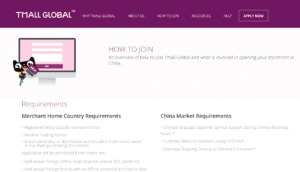Tmall plans to grow its marketplace globally in 2015
23/12/14
2'
One of the most important developments in 2014 was the rise of Chinese ecommerce. If there was any doubt earlier this year that China is serious about ecommerce, China’s Singles’ Day surpassing sales for Black Friday and Cyber Monday last month—thanks in large part to the popularity of ecommerce sites owned by Alibaba Group—proved otherwise.
The definitive moment of this ecommerce explosion was Alibaba Group’s September 2014 debut on the US stock market. This was a huge moment not only in Chinese history due to the fact that it was the largest IPO ever for a Chinese company; it was historic for the US as well because it was the largest IPO ever for any company from any country.
International Intentions
One thing to keep in mind is Alibaba Group is not just interested in being known as “the Chinese online business leader.” It wants to make its mark internationally and one reason is it is expected to do that in 2015 is its Tmall site will expand to new markets via Tmall Global (www.tmall.hk).
Before reviewing the details of Tmall’s plans to allow more foreign merchants to sell to the ever-growing Chinese online shopper demographic, it is important to take a look at Chinese ecommerce as it stands right now.
Lengow’s team just returned from Shanghai a few weeks ago after attending the 2nd annual Cross-Border eCommerce Conference China, where Lengow was also awarded the Best Cross-Border E-commerce Solution Award.
The observation on the ground from Lengow COO Nenad Cetkovic was that the best is yet to come in 2015.
“The Chinese ecommerce market operates very differently compared to markets in Europe. One thing to take note of is leading companies in China—Tmall and to a lesser extent Taobao—are owned by Alibaba. In this market, an online merchant will need to be assisted by a local actor like Tmall in order to understand its unique characteristics. Some of these include the way products are presented (the inclusion of more pictures and complementary product details) and customer support (acceptance of local payment platforms such as Alipay and 24/7 live chat support),” said Cetkovic.
“On the other hand, Chinese merchants are very open to international markets, including Europe and Latin America. However, they acknowledge their limited expertise in regards to efficiently promoting and distributing their products in Europe. This is why members of the Chinese ecommerce ecosystem recognize the value of the Lengow solution in regards to the aforementioned fields and decided to award us last month.”
One of the strengths of Tmall Global is it allows foreign merchants to customize their landing pages while also presenting products in a way that Chinese shoppers are using to seeing them. Tmall transactions are carried out with the aforementioned Alipay, which needs to be linked to merchants’ bank accounts. Merchants need to fulfill orders within 72 orders of payment, products need to be shipped directly to China and they must arrive within 20 days of an order being placed.
Merchants who want to setup shop on Tmall Global can do so within 3 to 4 weeks. They can get started—or ask questions about the procedure—by contacting Tmallglobal@service.alibaba.com.
More information about Tmall Global is also available at about.tmall.com.
Your e-commerce library
E-commerce for Retailers
Learn moreE-commerce for Brands
Learn moreL'Oréal Luxe Success Story
Learn moreSign up for our newsletter
By submitting this form you authorize Lengow to process your data for the purpose of sending you Lengow newsletters . You have the right to access, rectify and delete this data, to oppose its processing, to limit its use, to render it portable and to define the guidelines relating to its fate in the event of death. You can exercise these rights at any time by writing to dpo@lengow.com

Trending Posts
Marketing channels
Where does Gen Z shop online?
Gen Z online shopping is transforming the digital marketplace, setting trends that redefine what it means to engage with brands…
16/04/24
9'
Marketplaces
The Top 10 Marketplaces in Europe
The e-commerce scene is a vibrant mix of marketplaces in Europe. These aren't just websites; they're bustling hubs where millions…
08/12/23
7'
Marketplaces
Lengow Now Fully Supports Zalando Logistics Solutions ZSS and ZRS
Zalando, one of Europe’s leading fashion marketplaces, continues to raise the bar with its advanced logistics and fulfillment programs. After…
12/12/24
4'
Marketplaces
How to win the Buy Box on Marketplaces (Amazon, Zalando, etc.)
What is the most important thing for marketplace sellers? Exactly, the Buy Box! If you don't have the Buy Box…
02/04/24
10'
Marketplaces
How to Sell on Temu? Best Tips
Emerging under the vast umbrella of PDD Holdings Inc., Temu has skyrocketed in popularity as a shopping sensation from China…
17/08/23
5'





